It’s possible that I shall make an ass of myself. But in that case one can always get out of it with a little dialectic. I have, of course, so worded my proposition as to be right either way (K.Marx, Letter to F.Engels on the Indian Mutiny)
Friday, November 04, 2022
Wed, November 2, 2022
DUBAI, Nov 2 (Reuters) - Videos on social media showing Iranian security forces severely beating protesters have gone viral as anger grows at a widening crackdown with arrests of prominent figures from rappers to economists and lawyers aimed at ending seven weeks of unrest.
Protests ignited by the death in police custody of Mahsa Amini on Sept. 16 after her arrest for inappropriate attire have shaken Iran's clerical establishment with people from all layers of society demanding wholesale political change.
The nationwide demonstrations which have called for the death of Supreme Leader Ayatollah Ali Khamenei are posing one of the boldest challenges since the 1979 Islamic Revolution.
Iranian leaders have blamed the crisis on the United States and other Western powers, a narrative few Iranians believe.
Khamenei said on Wednesday that U.S. officials who support protests are "shameless", state media reported.
"Those who think the U.S. is an untouchable power are wrong," Khamenei said. "It is completely vulnerable as seen with current events."
Defying a harsh warning by the chief of the widely feared elite Revolutionary Guards, Iranians have risked their lives and arrest by remaining in the street despite a bloody crackdown.
One video dated Oct. 22 that went viral on social media showed a dozen riot police beating a man at night on a street in southern Tehran. One of the officers on a motorbike ran him over then another shot him at close range. Reuters could not verify the authenticity of the footage.
"This shocking video sent from Tehran today is another horrific reminder that the cruelty of Iran's security forces knows no bounds," Amnesty International said on Twitter about the Oct. 22 video.
"Amid a crisis of impunity, they're given free rein to brutally beat & shoot protesters. @UN_HRC must urgently investigate these crimes."
Other videos of the beating of protesters, which Reuters has been unable to verify, have also spread online.
Iran's police issued a communique on Tuesday saying that a special order was issued to examine the details of a video showing police officers beating a citizen, without giving any detail on the video in question.
"The police does not approve of harsh and unconventional treatment, the offending police officers will certainly be dealt with according to the law," the statement read, according to Tasnim news agency.
The activist HRANA news agency said around 300 people had been killed in the unrest, including 46 minors. Iran said at least 36 members of the security forces were also killed.
Some 14,160 people have been arrested, including about 300 students, in protests in 133 cities and towns, and 129 universities, it said.
The crisis has hit Iran's currency. The U.S. dollar was selling for as much as 342,600 rials on the unofficial market on Wednesday, losing nearly 7% of its value since the protests started, according to Bonbast.com.
On Monday night, security forces went to the house of prominent economist Davoud Souri and arrested him. The officers took his laptop and mobile phone with them, and after his arrest, they informed his family that he was at Evin prison, according to a social media post that Reuters could not verify.
Iranian media published on Wednesday a video of the arrest of famous Iranian rapper Toomaj Salehi, showing him blindfolded and saying he did not mean what he had said in previous comments critical of the authorities.
He was detained following his release of several rap clips in support of the protests. (Writing by Michael Georgy; Editing by Nick Macfie)
Adriana Villavicencio, Assistant Professor of Education, University of California, Irvine
Wed, November 2, 2022

Students of color have long needed more from schools than is typically provided.
National test results released in September 2022 show unprecedented losses in math and reading scores since the pandemic disrupted schooling for millions of children.
In response, educational leaders and policymakers across the country are eager to reverse these trends and catch these students back up to where they would have been.
But this renewed concern seems to overlook a crucial fact: Even before the COVID-19 pandemic, many schools were failing to adequately serve children of color. As a scholar of racial equity in K-12 education, I see an opportunity to go beyond getting students caught up. Rather than focus only on trying to close pandemic-related gaps, schools could seek to more substantially improve the quality of education they offer, particularly for students of color, if they want to achieve equitable and sustainable results.
Studying schools
For more than a decade, I’ve been conducting research on how schools can successfully serve Black and Latino students. Most of this work has focused on New York City, but what I have learned is critical for any school.
In one long-term study of a citywide initiative targeted at improving outcomes for Black and Latino boys, my colleagues and I collected data across more than 100 schools and through interviews with over 500 school leaders, teachers and students.
Based on this work, I’d like to highlight four critical conditions to improve the success and well-being of students of color.
1. Classrooms that reflect the students they serve
Research shows students do better overall when their teachers and the books students read reflect their race, ethnicity and cultures. Yet statistics show that seldom happens.
Children’s books depict nonhuman characters, like dogs and bears, almost three times as often as they depict characters who are Black, four times as often than Asian characters, five times as often than Hispanic characters, and nearly 30 times as often than Indigenous characters.
Moreover, while the teacher workforce remains nearly 80% white, research shows that students who had teachers of the same race had better chances of graduating from high school and enrolling in college.
2. Connection, not control
Students of color are more than twice as likely to be arrested at school as their white counterparts. And Black children who behave in the same ways as white children are twice as likely to be suspended for the same actions.
Many schools have established restorative justice programs, which emphasize repairing harm versus doling out punishment. These efforts can help shift teachers’ roles from controlling student behavior to forming connections with young people.
These connections can also be built outside formal classroom environments. Activities such as peer mentoring groups and student-led clubs are good opportunities for cultivating student-faculty connections. In those environments, students are more likely to feel comfortable being themselves and expressing their feelings about both learning and other issues relevant to their lives.
3. Equitable access to academic challenge
Teachers expect less of their Black and Latino students than they do of white and Asian classmates. Black and Latino students are also underrepresented in gifted and talented programs and less likely to be placed in such advanced coursework as eighth-grade algebra or Advanced Placement courses in high school.
When students have less access to rigorous learning opportunities, it can limit their progress in other areas as well. Students are more likely to enroll in college when they have taken four years of math and science. Yet Black and Latino students are less likely to be exposed to more advanced math and science courses, such as calculus and physics.
4. Teacher preparation and support
Teachers need strong preparation to serve an increasingly racially and ethnically diverse student population. But many teacher education programs are not preparing teachers to meet the needs of the students they teach, particularly in schools that primarily serve students of color.
Teachers are required to have ongoing training to keep their subject-matter knowledge up to date. Similarly, school districts could provide ongoing support for teachers to present broader depictions of history and society as part of developing culturally relevant classrooms, which draw on students’ backgrounds, identities and experiences.
The current political climate has become hostile to educators who broach topics of race and racism. Teachers may call on principals and other education leaders to shield them from backlash against exposing students to historical or current examples of racial injustice.
As schools seek to address pandemic-related gaps, there is now a unique opportunity to reimagine public education. For many students of color, business as usual wasn’t enough. Let’s learn from where we’ve been and aim for better than a return to normal.
This article is republished from The Conversation, an independent nonprofit news site dedicated to sharing ideas from academic experts. It was written by: Adriana Villavicencio, University of California, Irvine.
Read more:
Disasters like Hurricane Ian can affect academic performance for years to come
Pandemic shut down many special education services – how parents can help their kids catch up
Adriana Villavicencio receives funding from the Spencer Foundation and the William T. Grant Foundation.
Noah A. McGee
Thu, November 3, 2022

Photo: John Phillips (Getty Images)
The relationship between Hov and Bacardi continues to get messier and messier. Weeks ago, court documents showed that the Brooklyn rap mogul was looking to sell his stake in D’Ussé to Bacardi, which are both currently 50-50 co-owners of the cognac brand, according to TMZ.
Previously, Jay-Z filed a lawsuit to demand financial clarity from Bacardi when it came to the D’Ussé brand, including all of the records, books and the location of the warehouses where D’Usse barrels, bottles and accessories were being stored. The lawsuit also said he needs all of the information regarding Bacardi’s inventory and their inventory process. He wanted it all.
We now know he was trying to discover how much the brand is worth so he can get top dollar when he eventually sells his stake in the company.
But Bacardi said not so fast.
In response to Jay-Z’s lawsuit, Bacardi’s subsidiary, Empire Investments, says that both sides had a “handshake deal” last December that would allow Empire to buy Hov’s 50 percent stake in D’Ussé. But, according to TMZ, Empire claims that the “Holy Grail” rapper backed out of the deal and wanted double the valuation.
Jay’s company, SC Liquor, exercised an option last year for Bacardi to buy him out. They had been 50/50 partners in D’Ussé since its inception in 2012. Bacardi doesn’t disagree with that, but takes issue with Mr. Carter’s attempt to “outrageously inflate” the price ... in their words.
In the new docs, Empire/Bacardi doesn’t say what, if any, price they’d agreed upon when they made the handshake deal — much of the document is redacted as we’re guessing neither side wants any valuation of D’Ussé to be made public at this point.
Clearly, Jay-Z and his team think they are being lowballed on the price and Bacardi claims they have already agreed on a price and that Jay has to accept. Whether he eventually will or not is the big question.
https://www.theguardian.com/world/2002/aug/15/cuba.duncancampbell
Aug 14, 2002 ... The company is accused of bankrolling extreme rightwing groups and American mainstream politicians in an effort to remove Fidel Castro and ...
https://www.theguardian.com/GWeekly/Story/0,3939,778391,00.html
Aug 22, 2002 ... The company is accused of bankrolling extreme rightwing groups and American mainstream politicians in an effort to remove Fidel Castro and ...
https://www.wsj.com/articles/SB122118207525626203
Sep 12, 2008 ... Bacardi boss Pepin Bosch, who led the reorganization of Bacardi's operations outside Cuba after the Castro government confiscated its ...
https://www.afrocubaweb.com/bacardis.htm
The Bacardí family sells half the rum in the US and has a long history of supporting right wing Cuban American causes, including terrorist organizations.
https://www.nytimes.com/2008/09/24/books/24gewen.html
Sep 23, 2008 ... Yet once Fidel Castro passes from the scene, and the regime he ... The Bacardi Rum Company was founded by a Catalan merchant in 1862, ...

Thu, November 3, 2022
When the Chinese government judges a sector important and sets about shaping its development, it turns to a tried-and-tested economic strategy: industrial policy.
Now China is bringing that strategy to the metaverse.
The Chinese Ministry of Industry and Information Technology (MIIT) this week published a 12-page plan (link in Chinese) on developing the virtual reality (VR) sector and integrating VR with industrial applications like manufacturing.
The world’s first national metaverse industrial policy?
The MIIT document is China’s first national-level development plan for the VR sector, according to the financial news site Yicai (link in Chinese). Previously, official efforts to direct state resources towards developing a metaverse mostly took place at the city level.
MIIT did issue a set of “guiding opinions” on developing the VR industry back in late 2018 (link in Chinese), but that document predated mainstream discussions of the metaverse, which didn’t take off until Facebook (now Meta) and Microsoft began publicly discussing the concept in 2019.
How supply chain disruptions will affect the metaverse
Although the latest document doesn’t explicitly use the term “metaverse,” it does discuss at length numerous technologies that building a metaverse would rely on, such as head-mounted near-eye displays, and eye- and gesture-tracking technology.
And just because the metaverse lives in the virtual realm doesn’t mean it can escape the supply chain snarls of the physical world. The MIIT plan recognizes this. It says that China should aim for resilience by making its own breakthroughs in key software and hardware, so as to ensure domestic access to VR equipment and components.
The plan sets a target of cultivating 100 innovative and influential “backbone enterprises” in the VR field, and developing 10 pilot cities and industrial parks to demonstrate the industrial integration of VR and AR technologies in fields like media, education, mining, and natural disaster management.
More broadly, MIIT calls for directing national-level funds to nurture the VR sector. It encourages the development of “little giants” in VR, a nod to another industrial program that offers subsidies, priority access to loans, and other preferential policies to small- and medium-sized firms picked by the government for their special products and know-how in strategic sectors.
China’s metaverse-related stocks surged
The Chinese government wants its domestic VR industry to hit 350 billion yuan ($48 billion) in value by 2026, a sixfold increase from its level last year, according to the development plan.
An index tracking metaverse-related Chinese-listed stocks (link in Chinese) rose more than 5% on the news, with some constituent stocks surging over 20%. AVIT Ltd., a Shenzhen-listed manufacturer of VR games and equipment, saw its shares leap nearly 40% this week.
For China, the metaverse represents an important and emerging internet battleground. Establishing influence and dominance in this arena will be critical to achieving and maintaining Chinese technological prowess, according to a state-supervised metaverse industry group.
Chinese companies are investing heavily in the field. In August, Unity Technologies, a US game developer whose products are increasingly used to develop AR, VR, and the metaverse, struck a deal to form a Chinese joint venture called Unity China, valued at $1 billion. One of the joint venture partners is the Guangzhou-headquartered PCI Technology, an AI firm specializing in facial recognition and video analysis.
Other tech giants including Alibaba, TikTok’s parent ByteDance, and the state-owned telecom firm China Mobile have also invested in Unity China. They have individually also directed other funds into the metaverse. China Mobile, for example, has a subsidiary dedicated to creating digital VR and AR content. In March, Alibaba led a $60 million investment round into Nreal, a Chinese manufacturer of augmented reality glasses.
More from Quartz
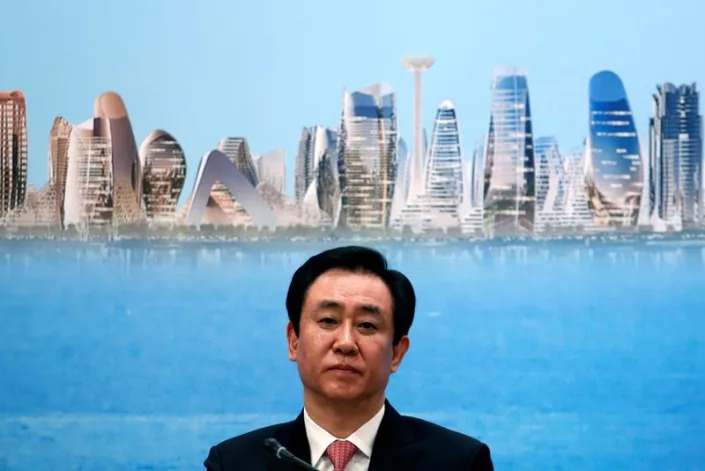
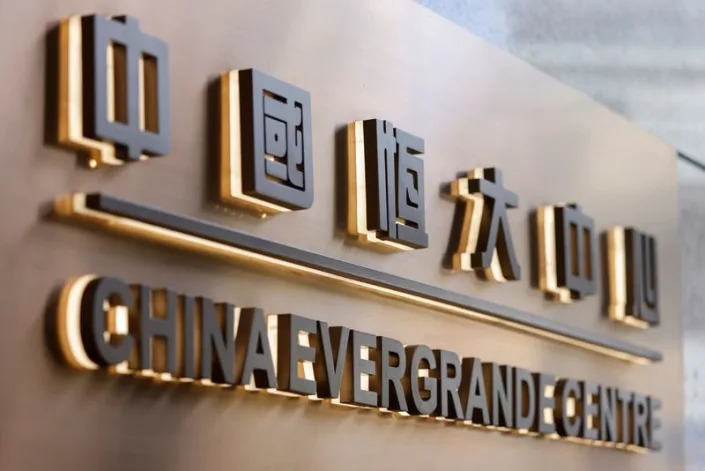
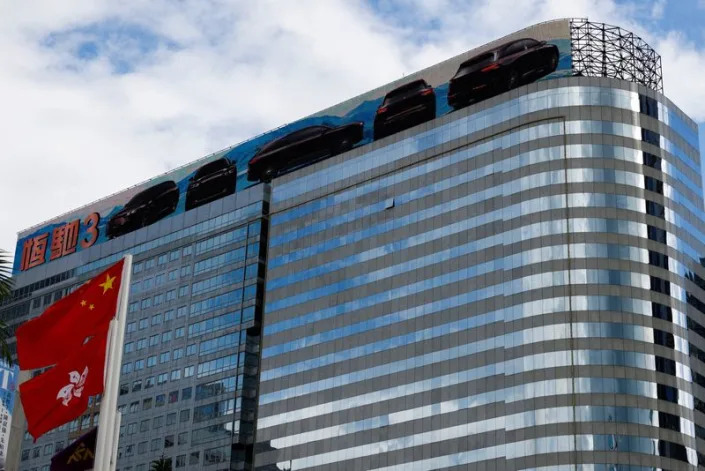
China Evergrande Centre is seen in Hong Kong
Wed, November 2, 2022
HONG KONG (Reuters) -A mansion belonging to embattled China Evergrande Group's chairman in Hong Kong's prestigious The Peak residential enclave has been seized by lender China Construction Bank (Asia), records from the Land Registry show.
The bank appointed receivers to take over the 5,000 sq ft (465 sq m) mansion on Nov. 1, according to a filing.
Evergrande declined comment and chairman Hui Ka Yan could not be reached. CCB (Asia) did not respond to a request for comment.
Saddled with more than $300 billion in total liabilities, the defaulted Chinese property developer has already seen many of its assets, both in mainland China and Hong Kong, seized by creditors.
Online news outlet HK01 first reported the foreclosure of the luxury house on Thursday, which it said was now worth HK$700 million ($89 million). The report added it could be the first known case of Hui's personal assets in Hong Kong being seized.
The mansion, with sweeping views of the city's gleaming skyscrapers, had been pledged to raise about HK$300 million to repay an overdue Evergrande bond, HK01 reported last year.
A filing with Hong Kong's Land Registry confirmed in October 2021 that the property had been pledged for a loan from CCB (Asia), although it gave no monetary figure.
Hui owns two other luxury homes in the same development in The Peak, which were pledged to Orix Asia Capital Ltd in November 2021 for undisclosed amounts, according to the Land Registry.
The latest records show the two properties have not yet been seized.
Evergrande's main assets in Hong Kong - its headquarters and a vast plot of rural land - were seized by creditors this year.
Chinese state-owned China Citic Bank Corp Ltd, lender to the office tower, took over the asset in September, and put it on a tender sale last month, while U.S. asset manager Oaktree Capital Management seized the land in Yuen Long district early this year.
($1 = 7.8498 Hong Kong dollars)
(Reporting by Clare Jim; Editing by Edmund Klamann, Ana Nicolaci da Costa and Tomasz Janowski)
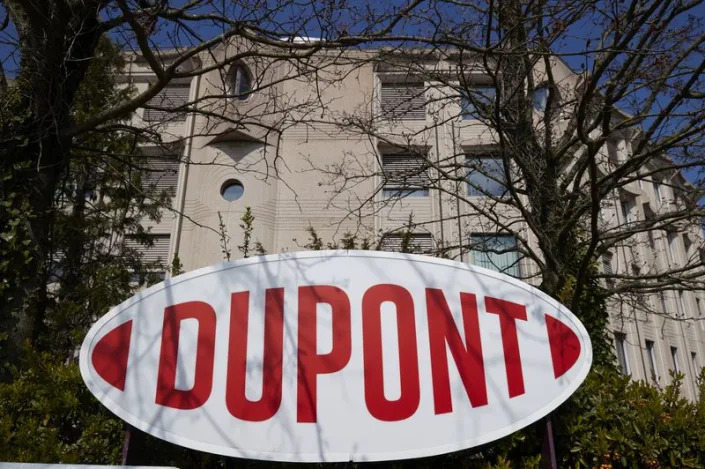
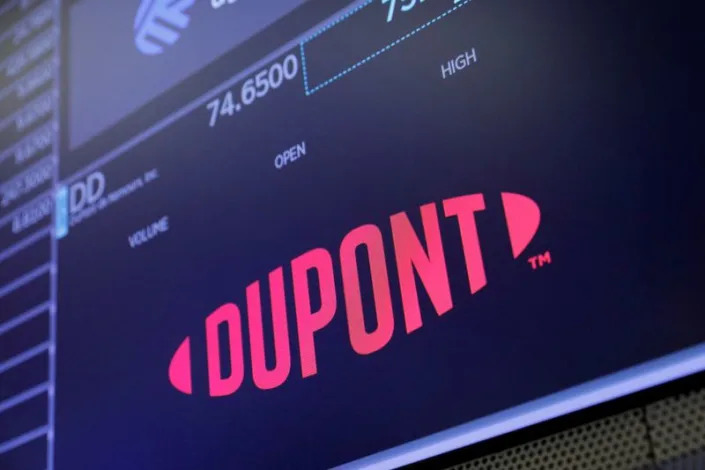
The logo DuPont de Nemours, Inc. for is seen on the trading floor at the New York Stock Exchange (NYSE) in Manhattan, New York City
Wed, November 2, 2022
By Anirban Sen
NEW YORK (Reuters) - DuPont De Nemours Inc's decision to scrap its deal to buy Rogers Corp has raised concerns that more Western buyers will follow the lead of the U.S. chemicals company in abandoning acquisitions because Chinese regulators will not clear them.
DuPont said on Tuesday it terminated its $5.2 billion acquisition of Rogers, a U.S. electronic materials maker, because of protracted delays in securing regulatory approval, marking the first major U.S. deal in four years to collapse because Chinese officials dragged their feet on providing clearance. Qualcomm ended its $44 billion purchase of Dutch peer NXP Semiconductors NV in 2018 after failing to secure regulatory approval.
China's regulators have declined to comment on the DuPont deal and have not provided a reason for the delay in reviewing it. But the deal's demise comes amid renewed trade and geopolitical tensions between Washington and Beijing that has fueled investor concerns that mergers could become a casualty.
One merger arbitrage fund investor, who declined to be named, said deals involving Chinese approval will be closely watched in the aftermath of the scrapped DuPont-Rogers deal.
Shares of some U.S. companies with a significant footprint in China that are waiting to complete deals dropped on Wednesday as a result.
Shares of Tower Semiconductor, which agreed in February to sell itself to Intel Corp for $5.4 billion, were down 4% on Wednesday afternoon at $41.31, a significant discount to the $53 per share deal price, reflecting doubt among investors over whether the transaction will be completed.
Shares of Altra Industrial Motion Corp, a U.S. automation equipment maker which agreed last week to sell itself to Regal Rexnord Corp for $5 billion, traded down almost 1% to $59.19, their biggest discount to the $62-per-share deal price since the transaction was announced.
Shares of U.S. chip maker Silicon Motion Technology Corp, which will require Chinese regulatory approval to complete its $3.8 billion sale to peer MaxLinear Inc, have dropped 40% since their transaction was announced in May.
Some investors cautioned, however, that the collapse of these deals hinges not just on whether Chinese regulators will withhold clearance but also on whether the acquirers are committed to the transactions.
In the case of Rogers, DuPont was happy to walk away rather than give the Chinese regulators more time because this year's market downturn had made the acquisition seem pricey compared to when it inked the deal 12 months ago, experts said.
"Investors felt that DuPont was paying too much for Rogers and there were expectations of a price cut," said Chris Pultz, portfolio manager for merger arbitrage at Kellner Capital.
(Editing by Deepa Babington)
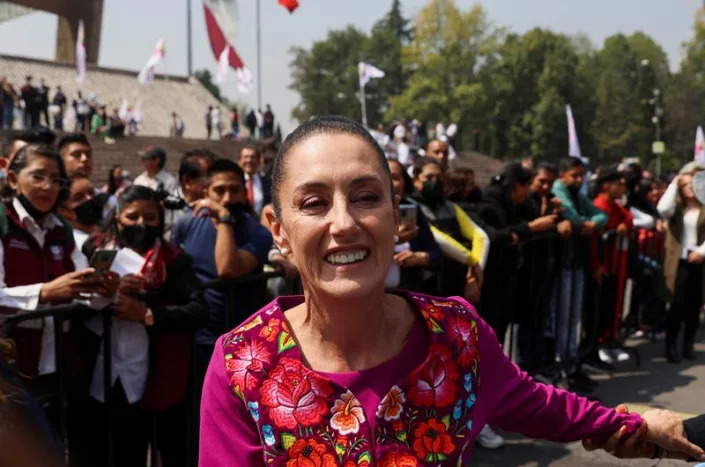
Mexico City Mayor Claudia Sheinbaum presents her fourth
Dave Graham
Thu, November 3, 2022
MEXICO CITY (Reuters) - The most historic legacy of President Andres Manuel Lopez Obrador, a left-leaning resource nationalist who casts his administration as a turning point in the annals of Mexico, may be to pave the way for the country's first woman leader.
Mexico City Mayor Claudia Sheinbaum, a 60-year-old physicist, environmentalist and longstanding ally of Lopez Obrador who has governed as mayor in tandem with his presidency, has emerged as early front-runner to be his party's candidate in 2024, despite hints she could be more moderate than him.
Polls give Lopez Obrador's National Regeneration Movement (MORENA) a commanding lead in the presidential race, currently making the election appear a battle between the ruling party's own contenders. Mexican law bars presidents from re-election.
Lopez Obrador, whose 2018 election ushered in a series of left-wing victories in Latin America, most recently on Sunday with the return of Luiz Inacio Lula da Silva in Brazil, has repeatedly stated publicly that he has no favorite.
But five senior aides to the president told Reuters they had no doubt he would most like Sheinbaum to follow him, on the basis she was most likely to cement in history his vision of making the state the principal engine of social change.
Lorena Villavicencio, a former MORENA lawmaker, agreed.
"Claudia guarantees the key programs of the 'Fourth Transformation' will continue," said Villavicencio, using the epithet Lopez Obrador claims for his government as an epochal shift comparable to Mexico's independence from Spain.
Socially conservative, the headstrong president has built his power base on higher welfare spending, state control of natural resources and expanding the role of the armed forces, while pillorying critics as corrupt and self-serving.
He has clashed with some feminists who view him as out of touch. Yet his government and Congress have also seen record female participation in a country where 'machista' culture has long been blamed for relegating women to subordinate roles and higher levels of violence against them than in regional peers.
Sheinbaum, who points to her record of making the city safer for women and providing free daycare for children, wants to take things further, pitching her candidacy as historic for women in Mexico and beyond.
"A woman in charge of the country would open new horizons and unleash the potential of other women. It would break the monopoly of men in public life," said Villavicencio.
Speaking on condition of anonymity to discuss sensitive matters, the aides said Lopez Obrador did not state his preference for Sheinbaum explicitly. They saw her as favorite based on their dealings with him, what he had said, and their assessment of political developments.
Things could still change if her bid falters, they noted.
Sheinbaum casts herself as the continuity candidate, both as custodian of his legacy and defender of his ideology, while hinting she could work better with investors in one area deemed crucial for Mexico's development: green technology.
She vows to boost renewable energy output in a way that spurs industrial development, thus addressing concerns raised by manufacturers fearful they would struggle to meet emission-reduction targets under Lopez Obrador's drive to prioritize output by Mexico's fossil fuel-dependent state energy firms.
"Our country has enormous potential in renewable energy," Sheinbaum told Reuters. "It's perfectly feasible Mexico is really entering an age of renewable energy."
Nevertheless, she also defends Lopez Obrador's contentious goal of ensuring power generation is split 54-46% in favor of the state in order to protect "energy sovereignty."
Sheinbaum's most prominent rival, Foreign Minister Marcelo Ebrard, is expected to be more business-friendly, half a dozen senior executives told Reuters. Still, they are quick to forecast both would be more encouraging to investors than Lopez Obrador.
Four of the aides said they believed the president preferred Interior Minister Adan Augusto Lopez, another MORENA contender, to Ebrard, also on ideological grounds.
Aides stress that what Lopez Obrador wants will be crucial in determining the candidate, even though he publicly denies this. The question is not settled because the president wants to see how the front-runners connect with voters, they say. He says the candidate will be chosen by polling organized by MORENA.
Recent surveys have tended to show voters slightly favoring Sheinbaum over Ebrard.
None of the party's front-runners command Lopez Obrador's political authority, but all are likely to be more conciliatory as leaders, officials, diplomats and MORENA politicians say.
'TIME OF WOMEN'
Sheinbaum cuts a sober and measured figure compared to the folksy and often polarizing Lopez Obrador, who has dictated Mexico's political agenda from 7 a.m. daily news conferences.
Sheinbaum's grandparents were Jewish immigrants from eastern Europe, and her election would be a milestone in Jewish history.
While saying she is proud of her heritage, Sheinbaum firmly stresses her Mexican roots, describing herself as a "guadalupana", namechecking the Virgin of Guadalupe, a defining icon of Roman Catholicism in the country.
She and her rivals have vowed to retain Lopez Obrador's welfare programs and his core agenda. They speak less of their own plans than of what they can do to burnish his.
Nationally, Lopez Obrador is far more popular than MORENA, which now controls nearly two-thirds of regional governments, giving it more power to mobilize voters.
"Mexico is at a special moment in its history. President Lopez Obrador's popularity stems from his personal, austere, simple way of governing," Sheinbaum said.
If Lopez Obrador hands power to Sheinbaum, it would help silence his feminist critics, officials say.
The rapid advances of women in Mexican politics plays to Sheinbaum's advantage, said Clara Brugada, MORENA mayor of Iztapalapa, Mexico City's most populous borough.
"It's the time of women," she said.
Sheinbaum has impressed in some areas where the president has struggled. Nationally, homicides have stayed stubbornly high. In Mexico City, she has cut them by half.
Many of Lopez Obrador's biggest public works look increasingly like they will not be completed on his watch.
It will fall to the next president, Sheinbaum says, to consolidate the Mayan Train - his rail project in the Yucatan peninsula - a new oil refinery in Tabasco state, and the inter-oceanic trade corridor he plans in southern Mexico.
RHETORIC
The polls to determine MORENA's presidential candidate are expected to be concluded by late 2023.
The perception Sheinbaum is the one to beat is widely held inside MORENA. Ebrard and some supporters have publicly urged MORENA to ensure contenders compete on a "level playing field".
MORENA cannot risk meddling with the polls' results, but how they are organized, structured and the questions they pose will influence the outcome, officials say. It is not yet clear who will be consulted, nor how many rounds of polling there will be.
One cloud hanging over MORENA domination is Mexico City, a bastion of the Mexican left which unites the president, Sheinbaum and Ebrard, who succeeded Lopez Obrador as mayor.
In May 2021, a Mexico City metro overpass collapsed, killing or injuring dozens of people. Ebrard, who built the fateful metro line when he was mayor, and Sheinbaum, whose maintenance of it auditors criticized, both took flak over the tragedy.
The following month, MORENA unexpectedly lost control of a majority of the capital's 16 boroughs in midterm elections that saw the party sweep aside the opposition in most states and record numbers of women securing gubernatorial office.
Lopez Obrador publicly voiced concern at the Mexico City results, which gave him pause about whether Sheinbaum was the right candidate, one of the five close aides said.
Still, opposition politician Alfa Gonzalez, a onetime backer of the president who in 2021 captured Tlalpan, the Mexico City borough Sheinbaum once ran, said it was Lopez Obrador's divisive rhetoric that alienated former supporters.
"The middle class played a crucial part in the opposition winning," Gonzalez told Reuters.
Describing Ebrard as the candidate most likely to take votes off the opposition, Gonzalez argued the degree of identification between Sheinbaum and Lopez Obrador meant their fortunes are now inextricably linked going into 2024.
"They're betting heavily on the president's pull," she said.
(Reporting by Dave Graham; Additional reporting by Diego Ore; Editing by Frank Jack Daniel)
Donna M Goldstein, Professor of Anthropology, University of Colorado Boulder
Wed, November 2, 2022

Kari Lake, the GOP candidate for Arizona governor, campaigns at a rally on Oct. 9, 2022. Joshua Lott/The Washington Post via Getty Images
After two former girlfriends accused Herschel Walker, the Georgia Republican Senate nominee and former football star, of pressuring them to get abortions, and giving them money for the procedures, Walker’s standing with conservative voters would have been expected to dip.
One reason is that Walker has taken an absolutist position on abortion – no abortions should be legal, even in the case of incest or rape or the health of the mother, he has said.
Instead, Walker has denied the allegations, and they appear to have boosted his odds of winning rather than diminished them. Why? Because he’s not a politician – he’s a celebrity.
We are sociocultural anthropologists who have studied white-collar crime and political corruption in the U.S. and Latin America. We can confidently say candidates like Walker, whose rule-breaking might have doomed a candidate in earlier times, benefit from a template developed by former President Donald Trump, who figured out how to turn celebrity status into political success.
This formula, which helped to transform Trump from a real estate mogul and celebrity TV character into the leader of the Republican Party, involves getting the public to register transgressive behavior as entertainment.
By adopting this template, several Trump-backed celebrity candidates have translated their personal fame into support from Trump’s base in the 2022 midterms.
A close look at Walker; Kari Lake, the GOP gubernatorial candidate in Arizona; and Mehmet Oz, the Republican senate candidate in Pennsylvania known as Dr. Oz, reflects how Trump has led politics down a path that not only prioritizes personality over policy, but also rewards celebrity politicians for behaving badly.

Georgia Republican Senate nominee Herschel Walker speaks to a crowd on Oct. 20, 2022, in Macon, Ga. Jessica McGowan/Getty Images
Trump’s celebrity candidates
Lake, a former news anchor for a local Fox TV station in Phoenix, was an Arizona celebrity when she announced her run for governor in June 2021.
Since then, Lake has engaged in political stunts, like falsely saying during a news conference that her rival, Katie Hobbs, broke into her campaign office dressed as a chicken.
Lake regularly berates journalists and has lied about Hobbs, falsely saying that she voted to block the Pledge of Allegiance being recited in schools. Lake believes the 2020 presidential election was stolen and has not said if she will accept the results of the 2022 midterms.
These antics are marked by celebrity rule-breaking and have mobilized Trump supporters.
Oz, meanwhile, established his fame as host of the Dr. Oz show, which reviewed medical and health products, especially diet-related products, and answered questions about health and wellness – on daytime programming. Now running to become a Pennsylvania senator, Oz has taken to mocking his opponent John Fetterman’s diet.
And during their live debate in October 2022, Oz questioned Fetterman’s recovery from a May 2022 stroke, asking whether he could understand and respond to what Oz was saying.
Walker has adopted his own Trump-style schtick by revealing an honorary sheriff’s badge to the audience during his only scheduled debate against Sen. Raphael Warnock. The move was intended to prove his pro-police bonafides. But the badge was not an actual police badge; it’s instead a token prop gifted to him by Georgia sheriffs.
Such performances by celebrity candidates don’t appear to diminish their reputations. In fact, they seem to attract voters who appreciate that these candidates don’t even try to act like conventional politicians.
Bad behavior before Trump
Celebrity politicians have always been held to a different standard than traditional politicians.
As media critic Neil Postman has noted, former U.S. president and Hollywood actor Ronald Reagan frequently said things that were untrue – and was not held accountable for doing so. Reagan praised the apartheid regime in South Africa for having ended segregation when it had not, and he repeatedly insisted that trees were harmful to the environment. Yet, he remained a popular political figure because most voters who backed him cared less about the veracity of what he said and more about his ability to tap into their emotions.
Sensing this, Reagan spent his time in the White House focusing on emotional impact rather than accuracy.
There are also examples of Democratic politicians behaving badly, and at odds with how they presented themselves as professionals. Jerry Springer was a Cincinnati councilman in the 1970s, before he resigned for paying prostitutes for sex. Springer went on to have a successful television career as a daytime talk show host. “Saturday Night Live” comedian Al Franken, who later became a Minnesota senator, resigned from his post in 2017 over sexual misconduct allegations. But in his case, Franken’s bad behavior pushed him out of politics, not further into it.
These kinds of political norms shifted with the rise of Trump’s political power, however, as Trump has relied less on his ability to inspire confidence than on his ability to amuse and entertain his fans.

Pennsylvania GOP Senate candidate Mehmet Oz appears with former president Donald Trump at a rally on Sept. 3, 2022, in Wilkes-Barre, Pa. Spencer Platt/Getty Images
The Trump shift
Throughout his political career, Trump has effectively used crude and derisive humor to elevate himself as an entertainer while transforming his opponents from sometimes stiff and humorless politicians into grotesque and laughable people. This humor would have been seen as rude and unpresidential if uttered by another person, or if said by Trump himself outside of the political arena.
Trump purposefully shames and embarrasses his political rivals, and his supporters celebrate these transgressions at his campaign rallies, which have become a collective space for his followers to revel in humiliating those he perceives to be his opponents.
At a 2016 rally, Trump mimicked firing a gun while critiquing a member of the U.S. Army who had been accused of desertion. In October 2022 at a rally, Trump threatened journalists with prison rape.
Such performances are effective not only because they inspire a call-and-response style of sycophantic celebrity fandom, but also because they resist the effect of criticism. No matter how harmful and demeaning Trump’s performances are to their targets, they can always be dismissed as comedic entertainment.
Walker, Lake and Oz are now also using their celebrity status to defy long-established rules of political engagement and to make morally questionable entertainment a viable political strategy.
These newly established rules indicate that Walker’s alleged hypocrisy will not be his political demise. The U.S. public is now conditioned to appreciate the antics of celebrities-turned-politicians and to believe that they should be held to different standards than everyone else.
This article is republished from The Conversation, an independent nonprofit news site dedicated to sharing ideas from academic experts. It was written by: Donna M Goldstein, University of Colorado Boulder and Kristen Drybread, University of Colorado Boulder.
Read more:
Republicans and Democrats see news bias only in stories that clearly favor the other party
Abortion is not influencing most voters as the midterms approach – economic issues are predominating in new survey

Britain's Kate, the Duchess of Cambridge views Girl with a Pearl Earring by Johannes Vermeer during a visit to the Mauritshuis in The Hague
Wed, November 2, 2022
AMSTERDAM (Reuters) - Two Belgian climate change activists who last week targeted the famous Johannes Vermeer painting "Girl with a Pearl Earring" have been sentenced to two months in prison by the Dutch court, of which one month was suspended.
To highlight how seeing artwork destroyed evokes a similar feeling to seeing the planet destroyed, one activist glued his head to glass covering the world-famous painting at a museum in The Hague, though the artwork was not damaged, gallery staff said.
"An artwork hanging there for all, for all of us, to enjoy, has been smeared by defendants who felt their message took precedence over everything else," the prosecutor said.
The public prosecutor had asked for four months of which two suspended, but the judge said she did not want her sentence to discourage other people to demonstrate.
The two men went to trial through a fast-track judgment on charges of destruction and open violence against the painting. A third activist, who did not agree with the trial being fast-tracked, will appear in court on Friday.
All three are part of the climate group Just Stop Oil Belgium, which is not affiliated with Just Stop Oil in Britain. Just Stop Oil Belgium said the verdict was "ironic".
"Isn't it ironic that climate activists who nonviolently oppose the mass slaughter of life on Earth are being condemned?", the group said in an email.
(Reporting by Charlotte Van Campenhout; Editing by Josie Kao)
Wealthy families are migrating to the U.S. South and UBS is following them
By Lananh Nguyen
NEW YORK (Reuters) - UBS is reshuffling its U.S. wealth leadership to focus on southern states that are crucial to the division's growth as affluent families increasingly migrate to Florida and Texas, the company said on Thursday.
The new structure for the world's largest wealth manager signals a big push into the southern United States alongside competitors such as Merrill Lynch Wealth Management, which has boosted its presence in Florida.
"We’ve seen our clients do well in the last decade in terms of their investment outcomes," said Jason Chandler, head of UBS wealth management in the United States. High net worth families are taking advantage of greater flexibility to live and work in different locations, he said.
UBS promoted John Mathews, who leads private wealth management, and Jennifer Povlitz, who runs its western division for wealth, to oversee 10 markets apiece across the United States, according to a company memo. The promotions, alongside a raft of other staff changes, will take effect at the start of next year and are intended to simplify management and decision-making, particularly in growth regions where wealthy people are relocating.
Ultra-high net worth families are moving from northern to southern states and are settling in multiple locations, and some financial advisers have followed suit by splitting their time across multiple offices, UBS said.
The bank's top markets for wealth management include Atlanta, Colorado, Florida and Texas, alongside traditional hubs in the Northeast like New York and Boston. "Wealthy clients are getting wealthier," and they are also "getting younger and more diverse," Chandler said.
UBS will streamline the wealth structure into 20 markets from 34. In Manhattan, it will merge the markets under one executive versus three market heads previously.
(Reporting by Lananh Nguyen in New York; Editing by Matthew Lewis)